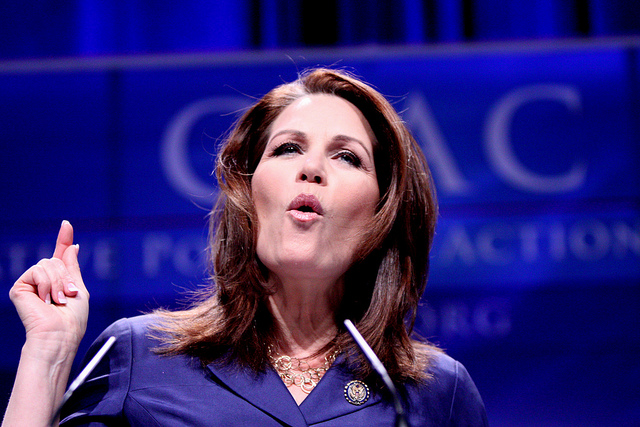Bachmann's Empty EPA Trash-Talk

On a recent campaign stop in Florida, Michele Bachmann waded into a political swamp by saying that she would drill in the Everglades if that “is where the energy is.” While she gave a cursory nod to drilling responsibly, it’s clear she had no clue about the environmental or political consequences of what she was proposing.
The Florida Everglades is a treasured natural resource that provides drinking water and other ecological benefits to much of South Florida. The state of Florida and the federal government have spent hundreds of millions of dollars restoring the Everglades—much of that at the direction of GOP Governors Jeb Bush and Charlie Crist. In 2002, the administration of President George W. Bush bought back oil and gas drilling rights in the Everglades for $120 million.
Bachmann apparently does not realize that oil drilling in the Everglades has been studied and that there is broad bi-partisan consensus that it would be foolhardy—very little oil, very high ecological risk.
Even one of her Tea Party colleagues in Congress, Allen West (R-FL) complained that she had committed an “incredible faux pas” by suggesting Everglades drilling. Still, Bachmann stands by the remark.
Bachmann’s drill-the-Everglades brain splat is just one in a long string of whacky, ill-informed and irresponsible comments Bachmann has made about energy and the environment.
She recently claimed that if she were president, gasoline would fall below $2 per gallon. Either she is planning on instigating a massive economic depression, or she is totally ignorant of how the global oil market works. With only 2 percent or so of the world’s proven oil reserves, U.S. production simply cannot impact the price of oil that much. Plus, the U.S. has no control over demand in other countries that puts upward pressure on prices.
Even if Bachmann blindly assumes that our unproven resources are vast, she fails to take into account that those remote and costly-to-produce resources could only be economically produced if the price of oil (and gasoline) were high. Should the price of gasoline drop below $2 per gallon, U.S. oil production would fall off a cliff because producers would seek out less costly OPEC reserves.
Bachmann likes to say that the U.S. is the “big daddy dog” of energy.
One thing she barks about in making that claim is “oil shale.” What she is actually referring to is kerogen, a low-grade hydrocarbon locked away in sedimentary rock. Not only has producing this stuff not been proven practical or commercially viable, it is a poor feedstock for conversion into motor gasoline, which accounts for some 40 percent of U.S. oil consumption.
The wackiness doesn’t end there. Bachmann also is under the erroneous impression that the Environmental Protection Agency (EPA) has “been busy locking up” our supplies of oil and natural gas. The Department of the Interior, not EPA, is the agency responsible for oil and gas leasing and permitting on federal lands and on the Outer Continental Shelf. EPA is responsible for issuing air permits for drilling rigs, but obtaining these is not typically a problem. Furthermore, the number of U.S. drilling rigs in operation has actually increased over the past three years, not decreased.
On another energy issue, Bachmann has repeatedly claimed that a 2007 efficiency standard for lighting bans incandescent bulbs, when simply reading the law and visiting the lighting aisle of any Home Depot clearly proves otherwise.
Of course, Bachmann has infamously pledged to eliminate the EPA. It apparently matters not that she would be undoing the environmental legacies of fellow Republicans Ronald Reagan and Richard Nixon.
Reagan’s action to combat smog as governor of California was a model that the federal government followed when Richard Nixon established EPA and Congress passed the Clean Air Act by sweeping bipartisan majorities.
Reagan was proud of what he had accomplished. During a presidential radio address in 1984, he said:
I’m proud of having been one of the first to recognize that states and the federal government have a duty to protect our natural resources from the damaging effects of pollution that can accompany industrial development.
President Reagan, a vigorous proponent of federalism who emphasized the states’ role, was clear in his belief that safeguarding our environment nevertheless requires a strong federal role. He said:
Those concerns of a national character--such as air and water pollution that do not respect state boundaries…--must, of course, be handled on the national level.
While Bachmann scapegoats EPA as a “job killing agency,” she offers no evidence to back up the claim. EPA has been busy during times of both boom and bust. Over the 40 years that EPA has been working to safeguard our air and water by enforcing the nation’s environmental laws, our Gross Domestic Product (GDP) has grown by 200 percent while common pollutants have been reduced by 63 percent.
For anyone concerned about our nation’s future, particularly as it relates to clean air and water and energy security, it should be terrifying to think that any reasonably serious candidate for president—and Bachmann is not alone—can be so ill-informed about energy and so oblivious to our basic stewardship obligations.
It is hard to see anything truly conservative in allowing a rigid ideology or political posture to close one’s mind, cloud judgment, and trump basic facts.
Another Republican, Theodore Roosevelt, warned his fellow Americans against following those leaders who may be well-intentioned “but whose eyes are a little too wild to make it really safe to trust them.”
In the coming months, Republican voters would do well to consider good ole TR’s advice.

